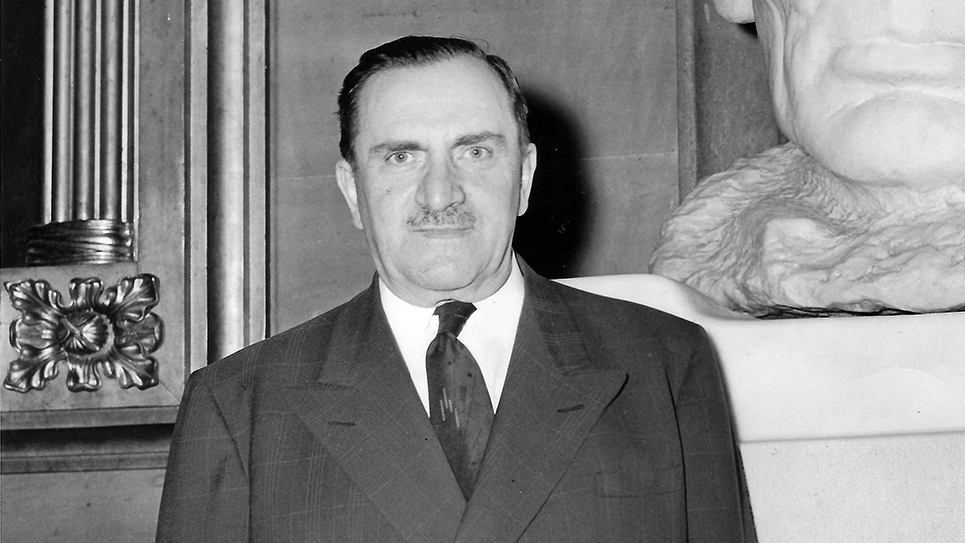By Ray Hill
It seems like so many folks my age are experiencing raising their grandchildren or having their own children return home to live. All too often, my generation has seen their children and grandchildren afflicted by drug addiction. Back in the day, the addiction that afflicted many in our country was alcohol. Addictions are the most democratic of torments, knowing no race, shape, size or color. Addiction can lay low both the rich and the poor; it can ruin the famous as well as the unknown. One of those unlucky souls who struggled with alcoholism was Virgil Munday Chapman of Kentucky.
Virgil Chapman was something of a political prodigy, first elected to Congress in 1924 when he was only twenty-nine years old. Chapman’s career in the House of Representatives was interrupted in 1928 when he was ousted by Republican Robert E. Lee Blackburn in a GOP landslide. The former congressman sought a rematch with his successor in the 1930 election and won decisively. As Kentucky failed to redistrict, Chapman was elected to Congress in 1932 at-large, meaning he faced voters across the Bluegrass State. Chapman was routinely re-elected every two years until 1948 when he became a candidate for the United States Senate.
In Congress, Virgil Chapman was known for his advocacy of one of Kentucky’s biggest cash crops; tobacco. A friend of the tobacco growers in particular and farmers in general, at first glance Chapman seemed an implausible statesman. Virgil Chapman was an ordinary-looking fellow, very overweight with a moon face and bald head. Quite frequently, the congressman wore heavy horn-rimmed glasses. Robert A. Caro drew a portrait of Senator Virgil Chapman in his book “Master of the Senate,” one in his series of biographical volumes on the life of Lyndon B. Johnson, which is both devastating and heart-rending. LBJ’s conferences with Senator Chapman, according to Caro, occurred during late afternoons or the early evening hours in the inner office of Johnson’s Senate suite. Johnson would sip his own watered-down drink while Chapman would consume his own usual glass of bourbon.
Caro wrote, “But while the host didn’t get drunk, the guest did, and, a happy, friendly drunk, the chubby Kentuckian was soon agreeing to whatever Johnson wanted.”
Robert Caro detailed in several paragraphs the decline of a longtime member of Congress in a matter of paragraphs. “Chapman’s alcoholism was rapidly growing worse. His round face with its heavy double chin seemed invariably flushed with drink now, and, more and more often, when he waddled through the tall door of the subcommittee’s meeting room, he would be too inebriated to follow the proceedings” and would ask a Johnson aide to sit directly behind him and signal how he was to vote. A tap on his right shoulder meant an “aye” vote while a tap on his left shoulder signaled a “no” vote. Horace Busby remembered, “I’d tap him on the shoulder; he’d jerk awake, and in this big voice boom out ‘Vote AAAH!’”
In 1948 Chapman was the choice of Governor Earle Clements to challenge John Sherman Cooper, a Republican who had first been elected to the U. S. Senate in 1946. Clements and Chapman had been classmates at the University of Kentucky. Cooper was a highly respected senator despite having only served two years before running for a full six-year term in 1948. Highly independent, Cooper was obliged to no one save for the people of Kentucky. Still, the odds against John Sherman Cooper being reelected were formidable. While virtually nobody believed Harry Truman could win the presidency in his own right, Alben Barkley, Kentucky’s perennial favorite son, was on the Democratic ticket as the vice presidential candidate. Kentucky was almost certain to fall into the Democratic column and there was good reason to believe it would carry Virgil Chapman upon the tide.
Chapman fought to win the Democratic nomination against sometime-congressman John Young Brown (father of the later governor of the same name) and then managed to disappoint his political sponsor Earle Clements; at least according to nationally syndicated columnist Drew Pearson. Pearson, a muckraking journalist much despised by most politicians and not a few who had dealings with him, wasn’t averse to stretching the truth, much less altering it considerably, to tell a story, especially if the story suited some ulterior motive. And Drew Pearson all too often had an ulterior motive. Pearson wrote several columns detailing Virgil Chapman’s problems with the bottle, which were highly embarrassing. Drew Pearson was hoping to see Senator John Sherman Cooper reelected. While the columnist was personally a very liberal Democrat, Cooper was one of the very few Republicans Pearson liked. Pearson’s column was one of the most widely read in the country and his influence was augmented by his weekly radio show. On one radio broadcast, Pearson charged Virgil Chapman had been paid $10,000 annually for the last 14 years and while regularly voting to increase the income tax on others, had not paid it himself. Pearson also said Earle Clements had cooled on Chapman’s senatorial candidacy, an accusation that brought a sharp retort from the governor. Clements snapped the columnist was a “congenital liar”, not the first time someone had made that particular observation about Drew Pearson. Tennessee’s own Senator Kenneth McKellar, by Pearson’s own estimation, had hit the heights of “gorgeous invective” in describing just what kind of liar the columnist was for his colleagues.
Drew Pearson wrote in a column that Virgil Chapman’s record was “not a happy one to recount.” Pearson explained, “This column does not comment on the private life of public figures – – – except where it interferes with their public duties.” The columnist went on to say, “But when a Congressman is so frequently under the influence of liquor that he literally has to be escorted away from public occasions where he has been scheduled to speak…” Pearson listed a number of things Congressman Virgil Chapman had supposedly done and the columnist wrote that voters had the right to know such things and it was “the unpleasant obligation of the Washington press to report these things.”
“These things” included Pearson’s reporting Congressman Chapman had been on an official trip to Alaska where he had ingested so much alcohol that he had to be taken to a hospital to recover. Pearson wrote Congressman Leonard Hall had to remove Chapman from a hotel bar lest the Kentuckian embarrass “the official mission.” Drew Pearson recounted the tale that Virgil Chapman, attending a meeting of the House Secretaries Association had become so drunk that “other guests pushed him outside the door” where he lay in the hall, “the fallen gentleman from Kentucky.” Pearson charged Chapman was so drunk at the Thoroughbred Horse Racing Association the previous year the toastmaster could not ask the congressman to speak. “Unpleasant as the above facts are, it is better that the people of Kentucky know them before an election, not afterward.”
Pearson’s allegations were serious enough to draw a rebuttal from Chapman. The senatorial candidate took to the airwaves to give a speech charging the columnist as being a liar as well as one who hated the Southland. Virgil Chapman reminded his listeners of what stellar Americans like the late President Franklin Roosevelt and former Secretary of State Cordell Hull thought of Drew Pearson. Speaking from WHAS radio in Louisville, Chapman said, “I still have a feeling of good will for every other human being, as long as he keeps his hands off my good name.” Virgil Chapman pointed to primary opponent John Young Brown as the real culprit. “Running true to form, with inevitable defeat as usual, staring him in the face, an opponent has resorted to even baser, viler, filthier tactics than in either of his two former unsuccessful campaigns against me… His present attack is without precedent for its slanderous character and malicious falsity,” Chapman thundered. As to Drew Pearson, Chapman told his radio audience, “In addition to being a notorious liar, he is also a notorious carpetbagger and hater of the South.” “He is the kind of agitator that is a menace to society,” Virgil Chapman warned. “He dislikes me because I am a plain, old-fashioned, constitutional, state rights, local, self-government, individual liberty, Jeffersonian Democrat and I believe that there is no room under the American flag for any ‘ism’ except pure unadulterated Americanism.”
As Harry Truman was carrying Kentucky with almost 57% of the vote, Virgil Chapman only narrowly was elected to the United States Senate. Chapman edged out Senator Cooper by just over 24,000 votes, winning with 51% of the ballots cast.
As Robert Caro indicated, Virgil Chapman’s alcoholism was apparently growing worse. The senator was driving his automobile on Connecticut Avenue in Washington, D. C. at 3:20 a.m. when he was going the wrong way and hit a Safeway grocery truck head-on. Chapman was crushed between the large steering wheel of his automobile and the front seat as the entire front end of his car had been demolished. Rescuers had to pry open the driver’s door to extricate the senator from his vehicle. Chapman was bleeding profusely from what appeared to be painful, although relatively superficial injuries, which included knocked out teeth and cuts and lacerations. The senator was hurried to Bethesda Naval Hospital and it was originally believed Chapman would recover. That was before doctors discovered the senator had suffered a fractured skull and internal injuries including a punctured lung. The fifty-five-year-old Virgil Chapman died on the operating table.
Officially, newspapers published that Senator Chapman had worked late at his office, “a frequent practice,” and had gone for a drive “through the quiet suburban streets of early morning.” According to the news stories at the time, Virgil Chapman had been heading home to the Army & Navy Club where he lived while in Washington and “swerved leftward to make a turn and crashed into the heavy truck…” Reports solemnly noted, “Police who investigated the accident said there was no evidence the Senator had had anything to drink.” Anyone who actually knew Virgil Chapman would find that impossible to believe.
March 11, 1951, a Sunday, Vice President Alben Barkley led a delegation of senators and congressmen to pay their final respects to Virgil Chapman. Amongst the Justices of the Supreme Court, Congressional and Cabinet members was a sprinkling of clerks and stenographers who remembered random kindnesses performed by a man who suffered from one of the worst of the frailties of the human condition, but one who intrinsically liked his fellow human beings. “If you knew him, you couldn’t help but like him,” was a frequent refrain heard around Capitol Hill just after Virgil Chapman’s passing. Tom Underwood, who had followed Chapman to Congress and would do the same with Chapman’s Senate seat, recalled, “You know, he lived by the principle that if you have true friends ‘grapple them to thy soul with hoops of steel’
“That was a quotation from Shakespeare’s play, Hamlet, that he quoted frequently,” Underwood told a reporter. “And he did. The friends he had, he kept.”
Chapman was an excellent speaker and powerful old-fashioned Southern orator. He would have been pleased with the tributes paid to him in the United States Senate. Earle Clements said those who knew Chapman best loved him the most.
Virgil Chapman’s body was shipped back to his home city of Paris in his native Kentucky. More than 2,000 people stood in a chilly March wind to say goodbye to the late senator. Mary Adams Chapman, a pert and still pretty woman who was the senator’s widow, looked wan and sorrowful. Hundreds of people stood silently as the funeral cortege passed on its way to the cemetery. There the body of Virgil Munday Chapman was lowered into the ground overlooking a tobacco warehouse. Chapman’s grave was covered by a carpet of Kentucky’s bluegrass which he had so eloquently extolled in his lifetime. Whatever personal demons had driven Virgil Chapman’s thirst for alcohol were driven out and he was able, finally, to rest.






